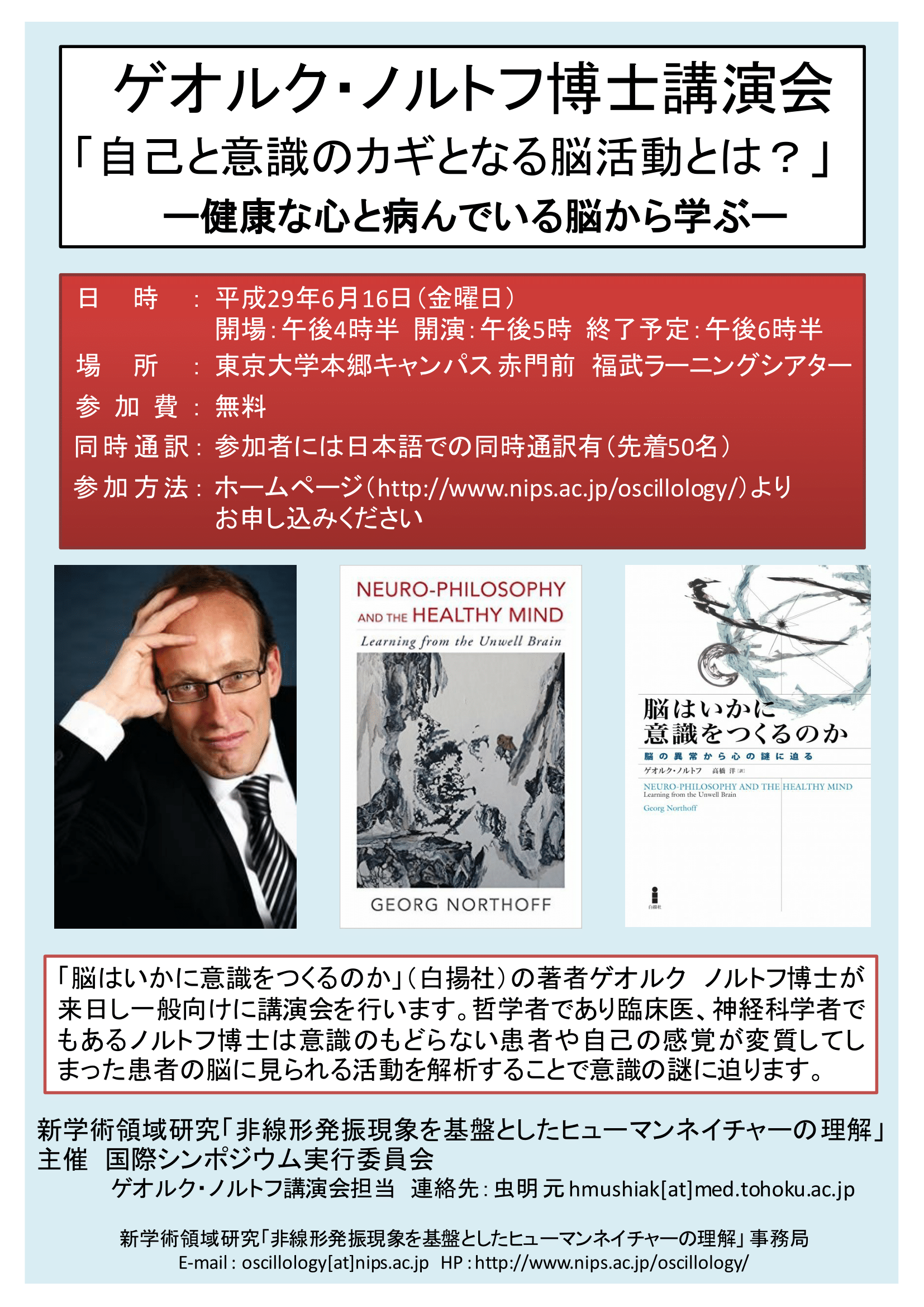研究会のお知らせ 国内
2017.9.13
講演会
フライブルク大学マルクース・エンダース教授連続講演
第1部:現象学「最も情緒的な価値応答としての愛:ディートリッヒ・ヒルデブラントにおける人格的愛の価値現象学的な理解について」
日時:10月6日(金)18:30〜
会場:上智大学(四谷キャンパス)7号館4階文学部共用室A
主催:上智大学文学部哲学科 長町研究室
連絡先:y-nagama[at]sophia.ac.jp(長町)
yoko0603[at]gmail.com(横山)
[at]を@に変えてご連絡ください。
http://www.sophia.ac.jp/jpn/info/access/accessguide/access_yotsuya
http://www.sophia.ac.jp/jpn/info/access/map/map_yotsuya
第2部:中世形而上学・神秘思想「マイスター・エックハルトによるマイモニデスの『一性形而上学』の受容と変容」
日時:10月7日(土)14:00〜会場:早稲田大学(文学部戸山キャンパス)39号館第7会議室
主催:早稲田大学文学研究科哲学コース 田島研究室日時:10月7日(土)14:00〜
会場:早稲田大学(文学部戸山キャンパス)39号館第7会議室
主催:早稲田大学文学研究科哲学コース 田島研究室
連絡先:non.nisi.me[at]gmail.com(西村))
[at]を@に変えてご連絡ください。
http://www.sophia.ac.jp/jpn/info/access/accessguide/access_yotsuya
http://www.sophia.ac.jp/jpn/info/access/map/map_yotsuya
どちらも入場料無料・事前予約不要です。発表自体はドイツ語ですが、日本語訳原稿が配布されます。また質疑応答には通訳がつきます。
ポスターはこちら
2017.4.30
ゲオルク・ノルトフ博士講演会
「自己と意識のカギとなる脳活動とは?―健康な心と病んでいる脳から学ぶ」
自己とは何だろう? なぜ、私たちには意識があるのだろう? こうしたかつて哲学の対象だった疑問が、いま脳科学で研究されるようになってきました。『脳はいかに意識をつくるのか』(白揚社)の著者ゲオルク・ノルトフ博士が一般向けに講演を行い、意識のもどらない患者や自己の感覚が変質してしまった患者の脳に見られる活動を解析した結果を挙げながら意識の謎に迫ります。脳の不思議や意識の問題に興味のある方々に向けて、斬新な観点からわかりやすくお話いただきます。英語で講演会は行われますが、イヤホンによる同時通訳有(数に限りがあるため先着50名)。
場所:東京大学本郷キャンパス・福武ラーニングシアター(赤門から入って左手すぐ)
日時:平成29年6月16日(金曜日)
開場:午後4時30分
開演:午後5時(6時30分終了予定)
参加費:無料
同時通訳:希望者には日本語での同時通訳有(先着50名)
主催:新学術領域研究「非線形発振現象を基盤としたヒューマンネイチャーの理解」
詳細ならびに参加希望の方は新学術領域のホームページをご覧の上、参加登録をお願い申し上げます。

2017.1.13
講演会のお知らせ
岡山大学文学部主催講演会
「哲学研究の最先端 自我と真理をめぐるヘーゲルとフッサール」
場所:岡山大学津島キャンパス 文法経1号館2階 文学部会議室
キャンパスマップ:http://www.okayama-u.ac.jp/tp/access/soumu-access_tsushima_all.html
津島キャンパスへのアクセス:http://www.okayama-u.ac.jp/tp/access/soumu-access_tsushima_all.html
日時:2017年2月6日 13:30-17:00
プログラム:
13:30-15:00 Andrea Altobrando (Hokkaido University) “On the Purity of the Ego: Husserl and Hegel”
15:00-15:20 Break
15:20-16:50 Giovanna Miolli (University of Padova) “The Relation between Ontology and Epistemology in Hegel’s Conception of Truth”
16:50-17:00 Closing Remarks
*使用言語は英語ですが、質疑には簡単な通訳がつきます。
共催 岡山哲学研究会
問い合わせ先 岡山大学文学部 植村玄輝(uemurag@okayama-u.ac.jp)
講演要旨
Andrea Altobrando “On the Purity of the Ego: Husserl and Hegel”
Although many interpreters have insisted that Husserl's idea of a pure ego is abstract, and although this is somehow stated by Husserl himself, I believe the aforementioned interpreters have followed just one of Husserl's hints in this regard. Following, they obtained an abstract, in the sense of partial, understanding of Husserl's thought about ego and subjectivity. Indeed, even if it is an "abstract" part of the totality of subjectivity and of the corresponding experience, the pure ego is a real constitutive part of both subjectivity and its self-experience. I will show that a more rightful interpretation of Husserl has to maintain the pure ego as something which must possibly be "sublated", but not “canceled”. Although partial, it is no "wrong" understanding of subjectivity.
The very term “sublation [Aufheben]" does easily remind of Hegel. Indeed, in the second part of my talk, I will show that Husserl's ideas about the pure ego can receive a kind of refinement by means of a consideration of what Hegel says in some of his works about the pure ego. I will point out that Hegel does clearly acknowledge the abstractness of an understanding of the subject as pure ego, but he also insists on the extraordinary importance of such an understanding for accessing the realm of the Spirit. The passage through the pure ego, as a matter of fact, enables the understanding of subjectivity in terms of freedom. To understand the pure ego as well as its sublation in an appropriate way is necessary in order to acquire a more adequate, as well as concrete account of the subject, as well as of its relationship with the world.
Giovanna Miolli "The Relation Between Ontology and Epistemology in Hegel’s Conception of Truth”
Speculative truth, as the “unity of the concept and reality”, means for Hegel the identity of truth and certainty. Such position could confuse us, because it seems to be conflating two different fields that ought to remain separated. By referring to “certainty”, we may have the impression we are engaged in a mere subjective concept, that is linked to the sphere of knowledge, and thus to the epistemological dimension. On the other hand, “truth” properly seems to embrace the domain of objectivity, indicating the sphere of being, one we could define as ontological dimension. My aim is to show how Hegel’s conception of truth exemplifies the merging of ontology and epistemology. This basically means that the positing and productive capacity of the concept is inseparable from the epistemic movement by which the concept knows and recognizes itself in what it has produced.
To reach my goal, I will analyse Hegel’s notions of “truth” and “certainty”, and their connection to subjectivity. In order to highlight the peculiarity of his proposal, I will contrast it with certain contemporary positions that face the truth-certainty matter. I will then concentrate on the specific features that characterize the merging of ontology and epistemology in Hegel’s conception of truth. This will require a presentation of the particular relation between the logical form and its content, and a clarification of the sense in which the logical content constitutes the proper reality of the concept. The conclusion hints at the possibility to read Hegel’s conception of truth, from a practical perspective, as a theory of self-knowledge and self-realization.
パンフレットはこちらです。
2016.12.5
第3回講演会
「ケア・ジェンダー・いのち:北欧における現象学の展開
場所:明治大学駿河台キャンパス グローバルフロント17階 C5会議
日時:2017年1月8日(日)15時00分~17時30
詳しくはこちら(ホームページ)をご覧ください。
第2回研究会
科研「北欧現象学者との共同研究に基づく傷つきやすさと有限性の現象学」
場所:明治大学駿河台キャンパス グローバルフロント17階 C5会議室
日時:2016年12月23日(金、祝日)13:00~18:00
詳しくはこちら(ホームページ)をご覧ください。
*このページは、会員のみなさま間から寄せられた情報をもとに掲載しています。詳細につきましては、各主催団体などにお問い合わせください。